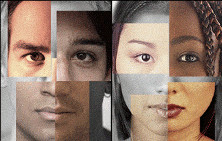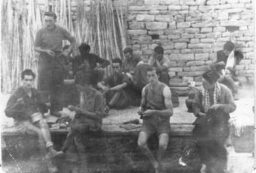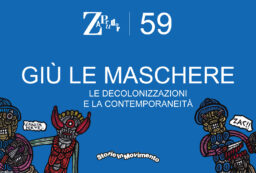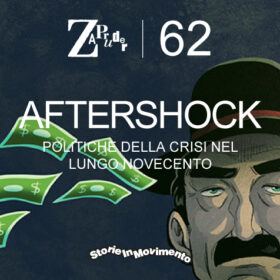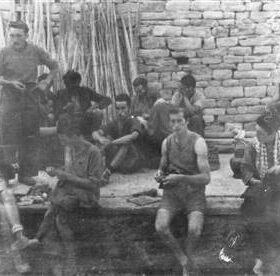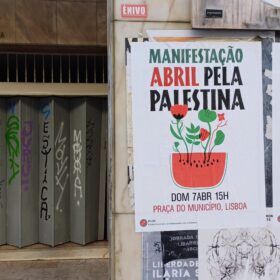Performig Race è il titolo della call for articles per il quarto numero di «Zapruder World», la nostra rivista sorella. Questo nuovo numero, co-curato da Irene Fattacciu e Claudio Fogu, mira a sfuggire dalla trappola definitoria che scatta ogni volta che affrontiamo la questione della razza: si tratta di un fatto biologico o di una costruzione sociale? Focalizzando l’indagine sull’importanza del quotidiano come luogo specifico di costruzione del discorso razziale, il numero indagherà a fondo la razza innanzitutto come pratica performativa.
Performing Race – special issue of «Zapruder World»: Transnational Journal for the History of Social Conflicts
edited by Irene Fattacciu and Claudio Fogu
Abstracts: 300-600 words
Deadline: 15 January 2017
[icon name=”envelope-o” class=”” unprefixed_class=””] info [at] zapruderworld.org
Journal presentation
Zapruder World is an online, open-access and peer-reviewed history journal coordinated by an international network of activists and scholars, both academic and independent. The journal’s parent organization, Storie in Movimento (SIM), has been active since 2002 and continues to publish the Italian journal Zapruder.
The aim of Zapruder World is to create a wide arena in which to exchange critical knowledge based on both individual research and collective elaboration. The journal focuses on social conflict paying particular attention to conflicts as movements rather than focusing on their resolutions, so as to better connect the history of social conflicts with current transnational cycles of protest. Zapruder World is animated by an aspiration towards “global history” but intentionally leaves its actual definition, contents, and methods open for discussion.
Volume 4 – Performing Race
Seeking to stake a position that does not fall into the definitional trap of considering “race” as a biological fact or as a social construction, the fourth issue of Zapruder World wants to explore the practices through which “race” acquires importance as performance and experience, by focusing on everyday life. Race is indeed not always important per se, but it becomes important through a series of specific practices that influence the way people behave, identify, and reproduce themselves. Racism permeates everyday life in ways often not obvious, affecting the ways in which people relate and look at the world, as well as their aspirations and their sense of identity. And, today, the social construction of “race” is consistently challenged in politics and popular culture by developments in genetic science as well as by public policies that pretend to measure race and establish categories to implement affirmative policies.
Critical Race Theory studies and those of connected fields (LatCrit, Feminist and Queer studies) have brought an essential contribution to a new understanding of race by looking at race as a performative identity, shifting the focus from macro-institutions to the mechanisms of formation of racial identities, still keeping the implicit political dimension of the operation. Yet the idea that racial categorization are primarily the product of historically determined social and cultural practices needs to be further investigated and substantiated.
How do the creation and reproduction of racialized discourse interact with the practices that implicitly underpin it? How does the process of construction of ‘race’ as performative identity take place through experiences and practices? Which are the appropriate analytical tools to explore the spaces where race was and is negotiated and socialized? How did the tensions occurred at different times/places between racialized institutional practices and patterns of resistance substantiated in forms of struggle against dominant conceptions of race?
In order to answer these questions, this issue aims to explore the ordinariness of race shaping the world around us through the set of environments, practices and relations within which we daily spend most of our time, and where the ways through which one is ‘raced’ (as well as gendered, classed and so on) are not necessarily explicit or understood. We invite contributions focusing on any area of the World since the 17th century, and that especially address one or more of the following fields:
- Consumer culture and consuming practices
- Racialized subjectivities, identities and performances
- Racial socialization (family, school ecc.)
- Racism and strategies of resistance in the workplace
- Marriage, love and sex
- The construction of racial identity through the experience of parenthood
- Body and racialized aesthetics
Although history is the main focus of this journal, multi- and interdisciplinary approaches, as well as contributions merging an historical perspective with other disciplines are highly appreciated. Intersectional approaches focusing on the intersections between race and gender as well as class are also particularly welcomed.
We also invite submission of non-essay form original work such photographs, videos, interviews, drawings, comics, songs, hyperlinks to online resources, multimedia, etc… both accompanying the articles themselves and as autonomous contributions. We encourage authors to think about incorporating multimedia both into their pieces proposed for Zapruder World and in the sections (e.g. “yesterday” and “today”) we have created on our website.
Submissions
Abstracts in English (300-600 words) shall be sent by January 15 to info [at] zapruderworld.org
All contributors will be informed about the status of their abstract submission by February 15, 2017.
Full articles (preferably 6,000-9,000 words) are expected by April 30, 2017.
The Manifesto of Zapruder World, the journal’s previous volumes, as well as guidelines for prospective authors can be found at: http://www.zapruderworld.org[icon name=”external-link” class=”” unprefixed_class=””].
(L’immagine di copertina è un fotogramma preso da questo servizio[icon name=”external-link” class=”” unprefixed_class=””] del 2009 realizzato dalla Nbc Los Angeles riguardo la mostra Understanding Race)

